NASA Confirms That Voyager I Has Left The Solar System
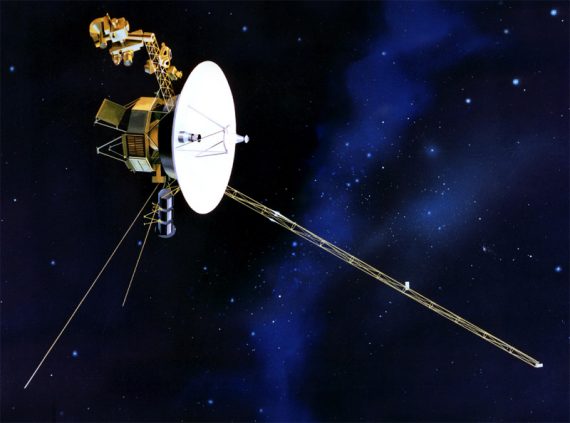 Thirty six years after it was launched, the first man made probe has entered interstellar space:
Thirty six years after it was launched, the first man made probe has entered interstellar space:
After 36 years of space travel and months of heated debate among scientists, NASA confirmed Thursday that Voyager 1 has indeed left our solar system and had entered interstellar space more than a year ago.
“Voyager has boldly gone where no probe has gone before, marking one of the most significant technological achievements in the annals of the history of science,” said John Grunsfeld, NASA’s associate administrator for the Science Mission Directorate.
At a Thursday news conference in Washington, D.C., officials said the belated confirmation was based on new “key” evidence involving space plasma density. The evidence was outlined in a paper published online Thursday in the journal Science.
Lead author Don Gurnett, an Iowa State plasma physicist and a Voyager project scientist, said the data showed conclusively that Voyager 1 had exited the heliopause — the bubble of hot, energetic particles that surrounds our sun and planets — and entered into a region of cold, dark space called the interstellar medium.
“When we got that data, I and my colleagues just looked at each other and said, ‘We’re in the interstellar medium.’ It was just that clear to us,” Gurnett said.
Gurnett calculated that Voyager crossed the edge of the heliosphere, or heliopause, at or around Aug. 25, 2012.
“Even though it took 36 years, it’s just an amazing thing to me,” said study coauthor Bill Kurth, a radio and plasma researcher at the University of Iowa.
Sister ship Voyager 2 is on a different path that will lead it to make a similar exit sometime in the next several years.

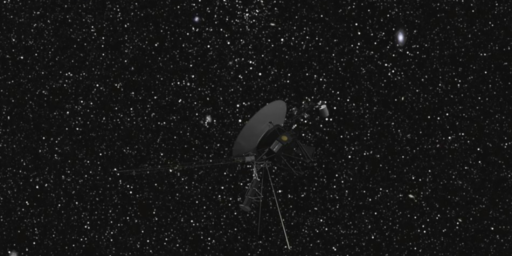
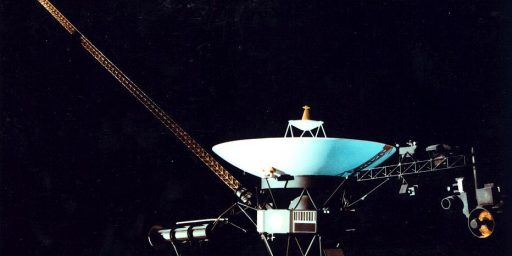
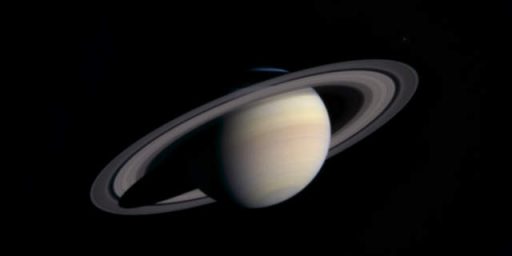
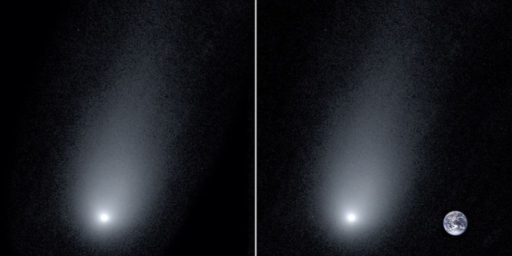
Farwell, little guy! Pick up a postcard or something.
Ob XKCD:
http://xkcd.com/1189/
gonna need a snickers at some point as it meanders the Milky Way…..good luck….
Meanwhile, congress is hard at work cutting NASAs funding.
Thirty Six years ago I was hoping that I would have left the Solar System by now!
But then there was this girl…
We’re behind schedule on the other 4 that we are supposed to have sent in the 90’s… Voyager 6 is going to miss it’s date with the machine planet.
It’s not the fact that V’ger…um, Voyager I has left the solar system that I find disconcerting. It’s the fact that as it left, it beamed back a radio message saying “so long, suckers!”
This does not bode well.
Technically, Voyager has entered the “interstellar medium” rather than interstellar space. It won’t actually leave the solar system until it has passed beyond the Oort Cloud. Guesstimates on the radius of the Oort Cloud range from 1.5 to 3 light years, so this won’t happen for another 200-400,000 years.
@mike shupp: Interesting, if true. Especially considering the closest stars are only about 4 light years away … would other stars have a similarly sized cloud like our Oort Cloud?
Franklin — So speculation goes. We see rings of material analogous to our asteroid belt and Kuiper belt around other stars, so something like an Oort cloud is a reasonable expectation.
Other hand, just to play Devil’s Advocate: the Oort Cloud is a 1920’s answer to the question “Where do really rare comets — I.e., long-tem and one-shot-visit comets –come from?” and back in the 1920’s it was taken for granted that stars mostly did not have planets or even asteroids and that even clouds of gas between stars were unusual objects. We know now this isn’t the case. that most stars are surrounded at their birth by debris which coalesces to form planets and asteroids and so on, that these debris fields attenuate over billions of years, that small faint red stars and even smaller virtually invisible brown stars are commonplace in the galaxy, that even smaller and cooler bodies — planets, basically — exist in space which are not gravitationally attached to suns. So it’s conceivable that Oort Clouds really don’t exist, and that large numbers of comets simply happen to be drifting about in interstellar space and we simply encounter them at irregular intervals.
To complicate matters, Oort clouds as such are essentially unobservable. The bodies they contain are too small and too far out to be observed in transit of a star, and they are too small and too cool to be viewed as objects in their own right, and so widely spaced that they don’t affect our view of the sun in the same way that clouds of gas would. OTPH., we’re pretty well convinced we see thick clouds of gas and debris around newly-formed and still-coalescing stars, so it seems logical that young solar systems contain the sort of far-flung materials which form Oort Clouds.
My layman’s take: Most stars will turn out to have Oort clouds, just as most stars turn out to have planets, but these will probably vary considerably in size and thickness. I’ve a suspicion as well that Oort clouds will often not be symmetrical — that the passage of other stars and light pressure from supernovae and so on will affect their shape. I suspect as well that we’re going to find there really are a lot of tiny rocky bodies wrapped in frozen gases — comets, in short — floating about in interstellar space, so Oort clouds are probably skimpier things than we now think.
WARNING: I Am Not An Professional Astronomer. Consult a Doctoir of Science if you require an Expert’s Advice.
@mike shupp: “WARNING: I Am Not An Professional Astronomer. Consult a Doctoir of Science if you require an Expert’s Advice. ”
Fortunately I can’t think of a single scenario under which I would require an expert astronomer’s advice, so I’m perfectly happy to be entertained and enlighted by a layman. Thank you!
Hmm. Three down votes for pointing out that congress is cutting NASA funding. Which it is.
@anjin-san: Let’s give the wizards on this thread the benefit of the doubt. The down votes are for Congress. Not for you.
My only regret is that it’s not the House Republican Delegation that is leaving the Solar System.